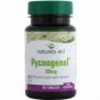-
Home
-
Contributors
-
International
-
Account
-
Information
More From Contributor
- Pycnogenol has been shown to be a potent scavenger of oxygen free radicals. Studies have shown that Pycnogenol is 50 times more powerful than Vitamin E & 20 times more powerful than Vitamin C. Circulatory System
- Pycnogenol offers support to the circulatory system by neutralising free radicals in the blood stream, preventing radical build up & promoting the integrity of the vessel walls. It is also able to support circulation in the extremities & in the capillaries that feed the eyes. Joint Protection
- Pycnogenol is able to inhibit certain proteolytic enzymes such as collagenase & elastase which degrade the collagen & elastin in connective tissue giving rise to such conditions as joint degeneration. Tissue & Organ Protection
- Pycnogenol plays an important role in the support of the blood vessels as described earlier & as a consequence of this it helps to support tissues & organs throughout the body that rely on adequate blood flow. Allergy
- Pycnogenol inhibits the formation of histamine which is responsible for causing allergic reactions. Skin Health
- Pycnogenol improves skin elasticity & smoothness during the aging process, as well as protecting the skin against the harmful effects of the sun. It has also been shown to be beneficial in cases of psoriasis. ...

Natures Aid Pycnogenol - 30mg 30 Tabs
causing allergic reactions, also improves skin elasticity and smoothness during aging.Pycnogenol is used for:Antioxidant - Pycnogenol has been shown to be a potent scavenger of oxygen free radicals. Studies have shown that Pycnogenol is 50 times more powerful than Vitamin E and 20 times more powerful than Vitamin C.Circulatory System - Pycnogenol offers support to the circulatory system by neutralising free radicals in the blood stream, preventing radical build up and promoting the integrity of the vessel walls. It is also able to support circulation in the extremities and in the capillaries that feed the eyes.Joint Protection - Pycnogenol is able to inhibit certain proteolytic enzymes such as collagenase and elastase which degrade the collagen and elastin in connective tissue giving
rise to such conditions as joint degeneration.Tissue and Organ Protection - Pycnogenol plays an important role in the support of the blood vessels as described earlier and as a consequence of this it helps to support tissues and organs throughout the body that rely on adequate blood flow.Allergy - Pycnogenol inhibits the formation of histamine which is responsible for causing allergic reactions.Skin Health - Pycnogenol improves skin elasticity and smoothness during the aging process, as well as protecting the skin against the harmful effects of the sun. It has also been shown to be beneficial in cases of psoriasis.
This page now acts as a permanent archive for this product. Add more information using the comments box below to ensure it can still be found by future generations.
Use our search facility to see if it is available from an alternative contributor.
- Availability: Out Of Stock
- Supplier: The Health Bay
- SKU: NA-19110
Product Description
Pycnogenol (pick-nah-geh-nol) is a unique natural plant extract made from the bark of the Maritime Pine tree which grows on the coast of France. It was Professor Jacques Masquelier who discovered the biochemistry, the needles contain vitamin C & the bark contains flavanoids. He isolated the first compound in 1951 & coined the term Pycnogenol. The trees are cut for timber & the bark is used to make this, one tonne of raw pine bark makes about 2.5kg of pycnogenol. As an antioxidant, it has shown to be 50 times more powerful than Vitamin E & 20 times more than Vitamin C. It also offers support to the circulatory system by neutralising free radicals in the blood stream, Joint Protection, Tissue & Organ protection, inhibits the formulation of histamine which is responsible for causing allergic reactions, also improves skin elasticity & smoothness during aging. Pycnogenol is used for: Antioxidant
- Pycnogenol has been shown to be a potent scavenger of oxygen free radicals. Studies have shown that Pycnogenol is 50 times more powerful than Vitamin E & 20 times more powerful than Vitamin C. Circulatory System
- Pycnogenol offers support to the circulatory system by neutralising free radicals in the blood stream, preventing radical build up & promoting the integrity of the vessel walls. It is also able to support circulation in the extremities & in the capillaries that feed the eyes. Joint Protection
- Pycnogenol is able to inhibit certain proteolytic enzymes such as collagenase & elastase which degrade the collagen & elastin in connective tissue giving rise to such conditions as joint degeneration. Tissue & Organ Protection
- Pycnogenol plays an important role in the support of the blood vessels as described earlier & as a consequence of this it helps to support tissues & organs throughout the body that rely on adequate blood flow. Allergy
- Pycnogenol inhibits the formation of histamine which is responsible for causing allergic reactions. Skin Health
- Pycnogenol improves skin elasticity & smoothness during the aging process, as well as protecting the skin against the harmful effects of the sun. It has also been shown to be beneficial in cases of psoriasis.
Reviews/Comments
Add New
Intelligent Comparison
We couldn't find anything!
Perhaps this product's unique.... Or perhaps we are still looking for comparisons!
Click to bump this page and we'll hurry up.
Price History
We couldn't find any historical pricing!
Vouchers
Do you know a voucher code for this product or supplier? Add it to Insights for others to use.
Jargon Buster
Supplier Information
Free delivery for orders of £40 or more.


 United Kingdom
United Kingdom
 France
France
 Germany
Germany
 Netherlands
Netherlands
 Sweden
Sweden
 USA
USA
 Italy
Italy
 Spain
Spain




 Denmark
Denmark